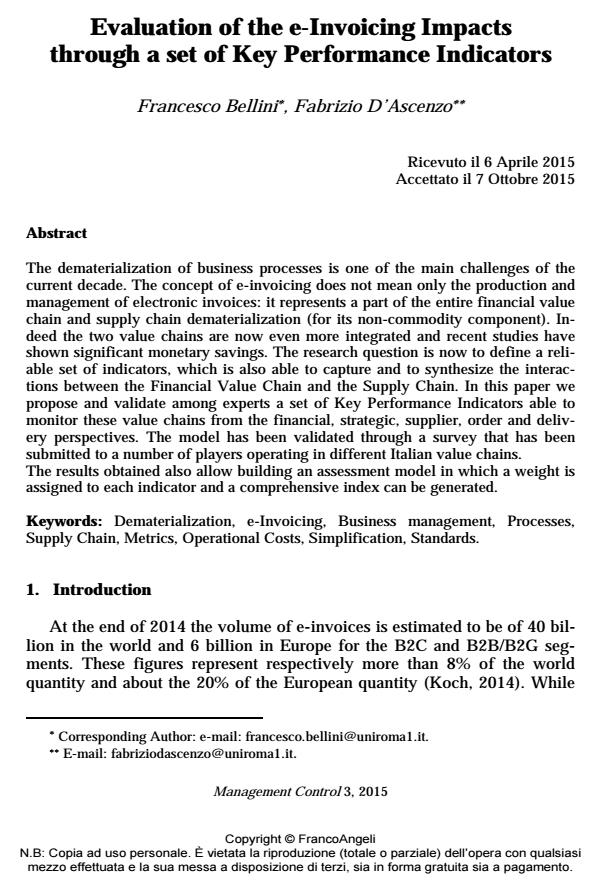Evaluation of the e-Invoicing Impacts through a set of Key Performance Indicators
Titolo Rivista MANAGEMENT CONTROL
Autori/Curatori Francesco Bellini, Fabrizio D'Ascenzo
Anno di pubblicazione 2015 Fascicolo 2015/3
Lingua Inglese Numero pagine 13 P. 9-21 Dimensione file 92 KB
DOI 10.3280/MACO2015-003002
Il DOI è il codice a barre della proprietà intellettuale: per saperne di più
clicca qui
Qui sotto puoi vedere in anteprima la prima pagina di questo articolo.
Se questo articolo ti interessa, lo puoi acquistare (e scaricare in formato pdf) seguendo le facili indicazioni per acquistare il download credit. Acquista Download Credits per scaricare questo Articolo in formato PDF

FrancoAngeli è membro della Publishers International Linking Association, Inc (PILA), associazione indipendente e non profit per facilitare (attraverso i servizi tecnologici implementati da CrossRef.org) l’accesso degli studiosi ai contenuti digitali nelle pubblicazioni professionali e scientifiche.
The dematerialization of business processes is one of the main challenges of the current decade. The concept of e-invoicing does not mean only the production and management of electronic invoices: it represents a part of the entire financial value chain and supply chain dematerialization (for its non-commodity component). Indeed the two value chains are now even more integrated and recent studies have shown significant monetary savings. The research question is now to define a reliable set of indicators, which is also able to capture and to synthesize the interactions between the Financial Value Chain and the Supply Chain. In this paper we propose and validate among experts a set of Key Performance Indicators able to monitor these value chains from the financial, strategic, supplier, order and delivery perspectives. The model has been validated through a survey that has been submitted to a number of players operating in different Italian value chains. The results obtained also allow building an assessment model in which a weight is assigned to each indicator and a comprehensive index can be generated.
Parole chiave:Dematerialization, e-Invoicing, Business management, Processes, Supply Chain, Metrics, Operational Costs, Simplification, Standards
- Accounting Information Systems in an Open Society. Emerging Trends and Issues Daniela Mancini, in MANAGEMENT CONTROL 1/2016 pp.5
DOI: 10.3280/MACO2016-001001
Francesco Bellini, Fabrizio D'Ascenzo, Evaluation of the e-Invoicing Impacts through a set of Key Performance Indicators in "MANAGEMENT CONTROL" 3/2015, pp 9-21, DOI: 10.3280/MACO2015-003002